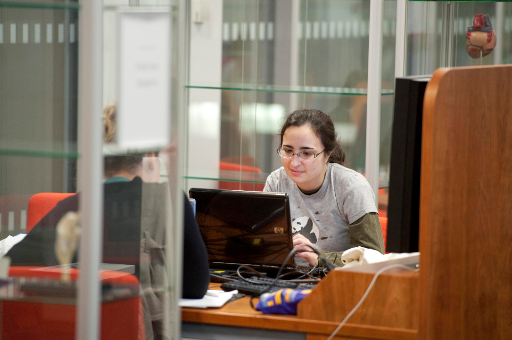Top 10 Study Tips for PhD and Masters Students
New year, new study habits! Our postgraduate students share their advice on how to study for a PhD or Masters degree without burning out.
Our study advice is perfect for any postgrads out there who are struggling to motivate themselves and need some tips on how to stay focused!
In the blog post below, we've put together ten bits of advice that could help you improve how you work, so keep scrolling down to read what our students have to say about studying more efficiently.
10. Work out when and where you are most effective
Perfecting your time management skills is probably one of the most important aspects of postgraduate study. Part of the process involves understanding when and where you work more effectively...

"I’ve done some excellent time management courses through the Institute for Academic Development here in Edinburgh and really understand now why I like to be in my PhD office around 7.30 but can’t bear to look at a paper after 4pm- my peak time hits first thing in the morning, and its down-hill from there on!
On my PhD days I’m free to plan my time as I like (by and large) so I’ve started to block time in the morning for reading, something I find nearly impossible to do effectively in the afternoon.
I’ve only been doing this for a few weeks but I’ve already found I have a much better grasp on the literature because I’ve been able to fully take in the papers I’ve been reading, rather than skimming them with coffee number 5 in hand at the end of the day."
Sarah, PhD Neuroscience, 1st Year
9. Make really thorough notes
Many of our graduates confessed that they wished they had taken better notes during their PhDs or Masters degrees. Keep on top of all your research and you'll make life a lot easier for yourself when it comes to writing up!
“I would say it’s imperative to make really thorough notes – so always write your protocols as you go along, gather your results up in a nice way and just make sure you’re on top of it as you go along.”
Phoebe, PhD Tissue Repair (2013-2017)
“Write down EVERYTHING. This refers to your daily notes such as lab book notes. At the time you’re going to think such minor details are not necessary or you will remember these things anyway, but when the perfect antibody you are using stops working all of a sudden, you’re going to need all the lot numbers. Writing down exactly what things didn’t work is often more important than what did as this can be very helpful in troubleshooting.”
Priya, PhD Edinburgh Cancer Research Centre (2013-2017)
8. Use all of the resources available to you
The University of Edinburgh provides postgraduate students with plenty of resources to help improve skills and develop learning. Don't let those opportunities go to waste...
“Use all the resources that the University offers you. The University has many skill-building workshops; there are also many societies that you can join and become a part of.”
Genevie, PhD Population Health Sciences, 3rd Year
7. Stick to a work-life balance that suits you and your needs

It can be hard to resist the temptation to keep working and working. Due to the independent nature of postgraduate study, it's not uncommon for students to feel guilty when they aren't physically sat at a desk writing or typing...but this simply isn't productive.
Genevie believes that this problem is even worse for international students...
“Have the work-life balance right from day one. As international students, when we don’t have anyone to go back home to it can be so easy to keep working for long hours in your office or in the library, for instance.
So make sure you have decent work hours in the day. Make sure you take breaks, make sure you go out and enjoy the beautiful city."
Genevie, PhD Population Health Sciences, 3rd Year
6. Don’t hide yourself away from the academic community
As a postgraduate student, it can be really easy to lock yourself away in a room somewhere or avoid communicating with fellow lab members. But this kind of exclusion won’t help your studies – we can learn a lot from bouncing ideas off other people or attending conferences which highlight new developments in the field.
“Don’t hide yourself. Communicate more with your supervisors, your colleagues, your friends. Go to academic conferences and academic seminars. Get out of your comfort zone. One year is really just the blink of an eye so make sure you grab this opportunity!”
Irene, MSc on-campus student, 2018
5. Plan a holiday away
Think about planning a short trip away somewhere. It will give you added motivation and provide some much-needed time away from the lab or your office.
"As we all know, mental health issues and stress are very prevalent among Ph.D. students. However, we are also privileged to have a more flexible schedule. We should also appreciate and take advantage of the fact that there are many cheap flights from Edinburgh to many European countries, whereas in my home country Canada, a 5 hr coach bus ticket to the next province costs at least £100. Of course, you need to first consult your supervisor, but it shouldn’t be a massive problem if you’re only away for a Friday or a Monday once in a while."
Amy, PhD Population Health Sciences, 1st Year
4. Create a schedule for every single day of the week

Mark was one of our online students who worked full-time while completing a Masters degree. He found planning was essential, especially when his work life intensified beyond expectations.
“Probably the most difficult thing I experienced was just trying to juggle everything. Work had been at surge capacity due to the severity of the year's flu season. I was able to keep myself afloat simply through creating a schedule for each day of the week and making sure I stuck to it.
Naturally, I was still exhausted and found myself falling asleep while I listed to the pre-recorded lectures so I just did the best I could. Thankfully, I was able to pass a gruelling 3-week intensive unit on Parasitology and can rest for a good month while focusing on my HIV class!
For anyone else trying to handle multiple things at once, make sure to outline a schedule! It really is a big help.”
Mark, MSc Clinical Microbiology and Infectious Diseases, 2018
3. Tackle imposter syndrome by accepting failure
Imposter syndrome is extremely common amongst academics of all disciplines. Michelle has some great advice on how to start tackling it:
"At the beginning of my second year I experienced the worst imposter syndrome I had ever felt. I was tasked with setting up a pretty complex experiment and didn’t really know where to start. After many failed attempts I started panicking. “Maybe I just can’t do it” I thought as I pictured myself being kicked off my program.
A few weeks later, however, it was done. I learned a lot from that experience, mostly about 2-photon calcium imaging, but also about myself. I was the right person for the job not because of my expertise in imaging (which was non-existent!) but because I can be resourceful and creative. Now, whenever I take on a daunting task, I think back to that moment and feel a bit more confident that I will figure it out.
But in reality, no matter how confident and skilled I am, sometimes experiments fail. Be it a mistake, an accident or a simple stroke of bad luck, it happens. And the only way to overcome a fear of failure is through exposure therapy. After a couple of rather spectacular failures, I have realized that there’s always a valuable lesson to learn from them. I won’t by any means say that I enjoy failing, but I can definitely say that for me, it is no longer the stuff of nightmares."
Michelle, PhD Integrative Physiology, 3rd Year
2. Know that you will get there and don’t lose hope
Stay motivated by accepting that whatever happens, you will be able to finish your degree. All postgraduate students experience obstacles and crises in their research or writing - it's not the end of the world.
"When everything seems to go downhill, don’t lose hope. I just started to work on my project and it gets desperate at times.
If you are feeling overwhelmed like I was (am), don’t let it out on your project, you’ll get there. You’ll fix it. You’ll get your results. You’ll have a thesis. Just give it time! And in the meantime, embrace the opportunity that you have in your hands. How many people could say that they were brave enough to do the same thing as you’re doing?"
Madalena, PhD Evolutionary Biology, 2nd Year
1. There’s plenty of time to do things other than your PhD/MSc
This one is mainly for our on-campus students but could easily apply to online students too!
“Make the most of the fact you are still in uni. Join societies, get involved with the community, learn a new skill – if all you did was your PhD you won’t be very happy or develop transferable skills that will help you find a job later. It is also nice to use your PhD skills in other settings, e.g. teaching and tutoring pupils.”
Priya, PhD Edinburgh Cancer Research Centre (2013-2017)
Remember to visit our Youtube channel to hear more from our past and current students about postgraduate life at the College of Medicine and Veterinary Medicine. You'll find study advice, testimonials and much, much more.
Related Links
How To Get A PhD - Ten Tips for Success
Five Tips On How to Set up the Perfect Home Office


